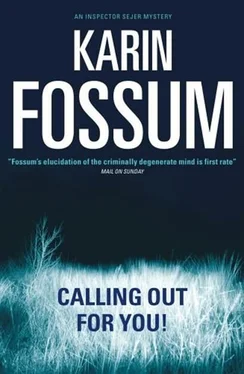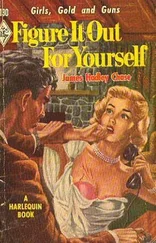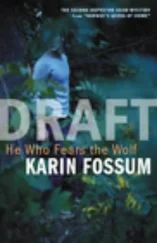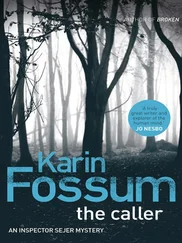He chose to ignore this. "But since then he's had far too much. This starvation – it'll pass, surely?"
"Something like that never passes," Sara said.
They turned off the lamps and sat in the twilight. A candle burned on the table. Sejer thought of Poona.
"Why did he destroy her face?" he said. "What does that mean?"
"I don't know," she said.
"There must have been a reason for it."
"Perhaps he thought she was ugly."
Sejer was astonished. "What makes you say so?"
"Sometimes it's that simple. You're bloody ugly too, he thinks, his fury is provoked and he crosses a line." She sipped her coffee. "What do you think? Is he desperately unhappy now?"
"Not necessarily. But I'd like to think he was."
"You're so upright," she smiled. "You'd like remorse."
"In this case it would be entirely appropriate. But when we catch him he'll above all be concerned with his own survival. Make excuses for himself. Defend himself. He has rights too, he'll say."
Sara got up and squatted on the floor next to Kollberg, scratching its back. He saw the heavy animal rock backwards and forwards contentedly beneath her hands.
"He has a lump under his coat," she said. "Here. On his back."
Sejer gave her an uneasy look.
"In fact, several," she said. "Three or four. Have you noticed, Konrad?"
"No," he said.
"You need to get him to a vet."
There was a trace of fear in his normally calm face.
"You know," she said, "at his age these things happen. And a dog his size – how old is he now?"
"Ten."
He remained on the sofa. Didn't want to touch the lumps. Fear filled him like freezing water. He got up reluctantly and searched with his fingers through the thick fur.
"I'll call first thing in the morning."
He sat down again and reached for his tobacco pouch to make a roll-up. His daily ration was one whisky and one roll-up. Sara looked at him lovingly.
"You're a man with enormous self-control."
Sejer had shut her out. Escaped from this business with the dog and gone to some other place. She could tell it in his eyes.
"There's not much through traffic in the area," he said in a far-away voice.
"Where are you now?" Sara said, confused.
"In Elvestad. Chances are that he's local."
"Good for you. I don't suppose many people live there?"
"More than 2,000."
"I could call the vet. and make an appointment. Or I could take him. You've got a lot on."
He lit the roll-up. It was unusually thick.
"You might as well roll two slim ones," she teased him.
"They might just be cysts. Filled with fluid."
She heard the anxiety in his voice and how he suppressed his fear. The lumps did not contain fluid, she was sure of that.
"We've got to get them looked at. He's finding the stairs difficult."
"For all I know we've already spoken to the killer," he said.
Sara shook her head. She kept on stroking Kollberg's back. The dog was aging. He didn't want to see it. His brow was deeply furrowed. The business with the lumps reminded him of something. He was in a place which was shut off to her.
"He's thinner, too. When did you last weigh him?"
"He weighs 70 kilos," Sejer said stubbornly.
"I'll get the bathroom scales."
"Are you mad?" He frowned. Once she was out of sight he sprang up from the sofa and knelt down. Raised the dog's heavy head and looked into the black eyes.
"You're not sick, are you, old chum? You're just getting on a bit. So am I."
He placed the head softly on the dog's front paws. Sara came back with the scales.
"Hang on," he said. "He's not a circus elephant."
"We'll try," she said. "I'll get a cold potato."
The dog sensed that something was about to happen and got up eagerly. They wound the scales to zero and nudged him on to them. They pushed his paws together and Sara supported his sides. He recognised the familiar smell of food and wanted to co-operate. After much encouragement Kollberg finally shook hands while he stood wobbling on his three remaining legs. Sejer looked down at the digital display: 54.9 kilos.
"He's lost 15 kilos," said Sara.
"It's his age," he said.
Kollberg swallowed the potato and lay down.
She snuggled up to Sejer's chest. "Tell me a pretty fairy tale," she pleaded.
"I don't know any fairy tales. Just true stories."
"Then we'll have a true one."
He put the cigarette on the edge of the ashtray. "Many years ago we had some trouble with a petty criminal called Martin. That wasn't his real name, but like you I have a duty of confidentiality."
"Martin is fine," she said.
"Martin was a familiar face. Did all sorts of things: car theft, fraud, stole from people's garages. He had a rather weak character and served an endless series of sentences, usually three to four months. He also drank. Apart from all that, he was a rather charming fellow, except that he had awful teeth. He had only a few rotten stumps left. He would put his hand in front of his mouth whenever he laughed. But we liked him and were concerned about him. We were afraid that one day he'd be caught up in serious crime. We discussed what might be done to rehabilitate him, and we thought about his teeth, whether it was worth fixing them. We contacted social services and asked for funding to replace his teeth; he had no resources of his own. They asked us to submit an application, which we did. We wrote that it was an important part of his rehabilitation. Teeth are important, you know. And believe it or not, we got the funding. Martin had to go through with it. During his sentence he went to the dentist three times a week and when eventually he finished he had a mouthful of flawless, bright white teeth. Like yours, Sara."
He inhaled her hair. "Martin was a new man," he recollected. "Held his head high. Cleaned himself up, got a haircut. Then there happened to be a woman working in the prison library. She lived on her own with her daughter and had taken this job to earn some extra money. She fell in love with Martin. He completed his sentence and moved in with her. He still lives with her and is a good father to her child. He has never offended from that day to this."
Sara smiled. "That was almost better than a fairy tale," she said.
"It happens to be true," he said. "But the man we're dealing with here has bigger problems than Martin."
"Yes," said Sara sadly. "He needs more than a dentist."
September 10th. Shiraz Bai had arrived in Norway. He was installed at the Park Hotel at Gunder's expense. Sejer rang Gunder.
"If you wish, we can arrange a meeting at the police station, that way you don't have to be alone with him. He'll probably have questions which might be difficult to answer. He speaks English, but not too well."
Gunder stood by the telephone, mulling it over. Looked at the photograph of Poona. Wondered if he resembled his sister. He's my brother-in-law, he thought. Of course I need to go. But he didn't want to. He imagined an endless list of stinging accusations. How would he find the courage to face that?
It seemed important to look his best. He showered and put on a clean shirt. Tidied all the rooms. Perhaps Bai would like to see the house which was to have been Poona's home. The fine kitchen and the bathroom with the white swans. He drove slowly into town. Skarre was waiting for him in reception. That was really very considerate, Gunder thought. They understood so much. He hadn't expected it. He entered the inspector's office and saw him straightaway. A lean man, not particularly tall, and so like his sister that it startled him. Right down to the protruding teeth. His face was pock-marked and his skin was darker than Poona's. He was wearing a nice blue shirt and pale trousers. His hair was greasy and needed cutting. His gaze was evasive. Gunder approached cautiously when Sejer introduced them. He looked into his brother-in-law's solemn face. He saw no accusation, his expression was completely closed. Just a brief nod. The handshake was an unwilling touch. They were each offered a chair, but Bai declined. He remained standing by the desk as though he wanted this to be over and done with quickly. Gunder had already sat down. He was filled with melancholy. He was close to giving up on it all. Marie was still in a coma. His world was coming to an end.
Читать дальше












